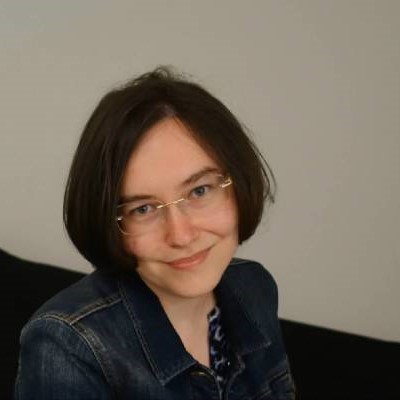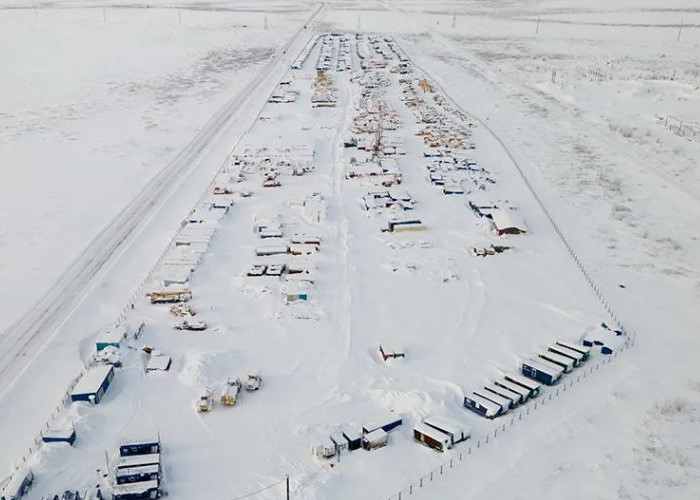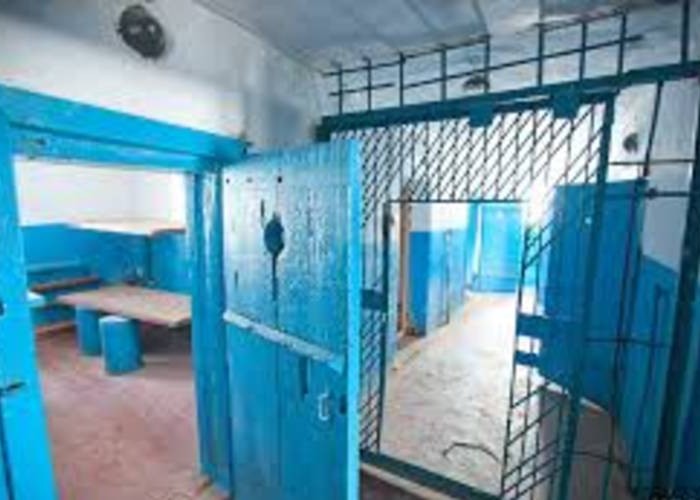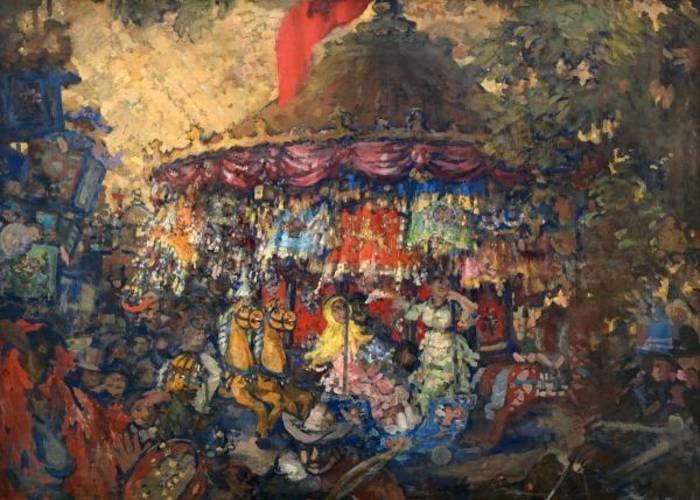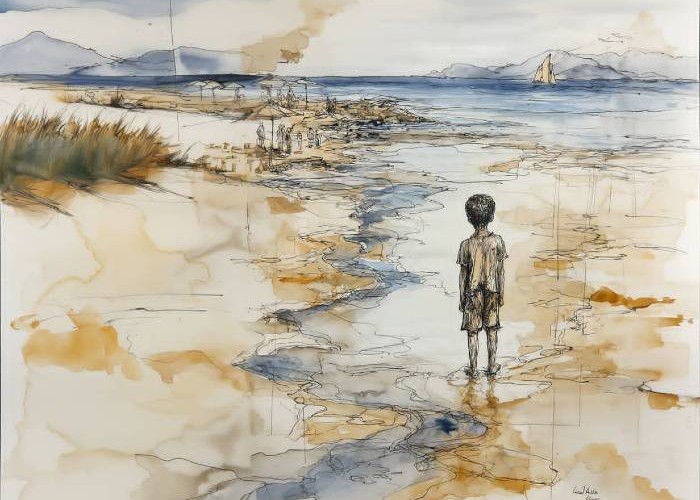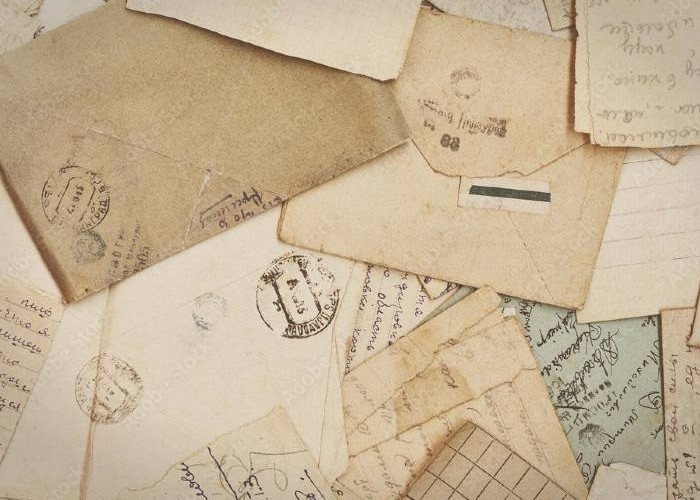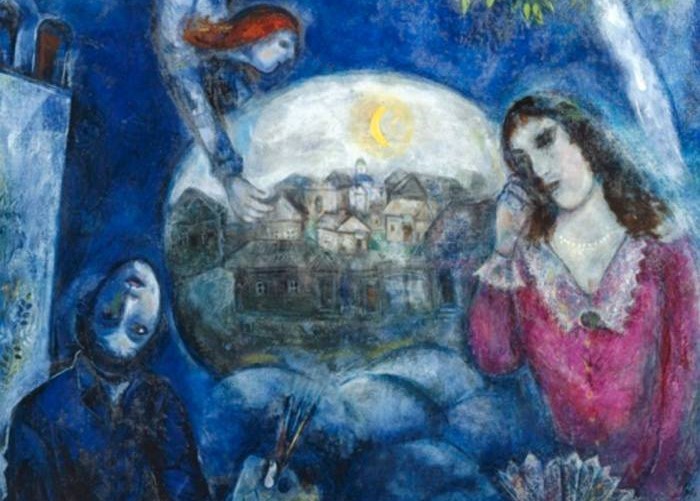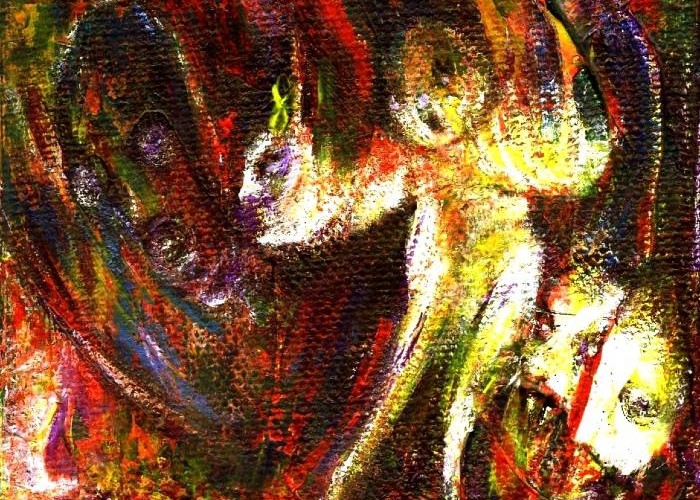“But have you made your final decision?” Danka asked him, perhaps for the tenth time. Her eyes, filled with both anxiety and sorrow, pierced Goran, filling him once more with a deep sense of guilt. Again, he tried to convince her and himself that his decision was the only correct one, the best one possible, and entirely safe.
“We have already agreed on everything,” he repeated, his voice insistent.
“But you don’t know her at all!” Danka exclaimed. “Perhaps she harbors ill intentions? What if she’s a witch, exploiting your weakness to destroy you?”
“You too?” Goran’s eyes flashed, revealing something sinister and frightening, lurking deep within him. Danka involuntarily shuddered. “Do you also think that forest fairies are witches?”
“No, not at all,” she quickly reassured him. “That’s not what I meant. I fear she might be a witch in the guise of a fairy. We don’t even know for sure if she is who she claims she is.”
“I can recognize a true fairy,” Goran said coldly. “Don’t forget what kind of blood runs in my veins.”
His words sounded like a challenge, and Danka knew well the reason for this. Goran was the son of a vila, a forest fairy taken treacherously as a wife by his human father. From ancient beliefs, Danka knew vilas typically did not harm humans and could even aid them. Yet, rumors also spoke of how overly fond these forest beings could become of men, and how jealous they could be of their earthly lovers.
“Even if she is a real vila and wishes to help you,” Danka began timidly, “don’t you think she could erase all your memories, making you forget about me and about our home, so that you never return?”
“I am the son of a vila,” Goran repeated stubbornly. “No fairy will ever harm me.”
“I’m not talking about harm,” Danka explained patiently. She finally looked up from her work—carefully straining the curd mass to separate it from the whey. Danka made the best cheese in the village—fragrant, melting in the mouth better than any sweets, intoxicating with its spicy aroma. She set the future cheese aside, wiped her hands on her apron, and sat down at the table opposite him.
“A vila might believe she’s doing you a favor,” Danka continued insistently. “What if she decides your place is with them and not here? She might think you’d be happier if you forgot us all. But do you want to forget this life—forget me—and know I will remain here alone?”
Her anxiety wafted to him like a light draft, disturbing the comfort of their village home, spreading fear like a harmful infection. Goran couldn’t deny that Danka’s fears had merit. Legends of the vilas’ kindness coexisted with tales of their cunning, and no one fully understood how their magic could affect a person—even one not entirely ordinary.
“She won’t be able to take me with her,” Goran asserted, trying to sound confident. “A man cannot be a vila; he cannot fly. Thus, I could never reach where the fairies dwell. Only serpents can ascend there, and I am clearly not a serpent. Besides, the vila promised me that we’re only talking about my first five years. Those five years brought nothing but nightmares into my life, and I don’t want to—and can’t—remember them!” he said angrily, turning away.
“I know, my dear, I know,” Danka responded, helplessly bowing her head before his grief. In such moments, she felt her powerlessness acutely, as one does in the face of an incurable disease—a wall separating the patient from those who love him infinitely. Danka knew precisely what her young husband wanted to forget, and the deep wound in his heart that he carried throughout his life, unable to rid himself of it.
His mother was indeed a vila—a winged forest sorceress who, like her other tribesmen, lived high in the mountains, inaccessible to people. Yet, like many of her kind, she sometimes ventured into human realms, where she met her future husband, Svetozar, Goran’s father. Madly in love with the golden-haired fairy beauty, Svetozar took her wings, turning her into an almost ordinary woman. Only her horse hooves, carefully hidden under long white garments, betrayed her forest origins.
Svetozar made her his wife, and soon, little Goran was born. However, as is often the case with vilas, the former fairy began to grow weary of human life. She longed for the endless forest expanses, the mountain peaks piercing the sky, the thundering walls of waterfalls, and the uneven squares of fields bordered by forests and dotted with villages. Svetozar, already a reveler and a drunkard, grew more reckless, seeing the indifference of his young wife. During one of his sprees, he boasted to his fellow villagers that he was married to a real vila.
The village men took his boast with skepticism, but a severe drought soon struck, followed by famine. Desperately searching for a scapegoat, the villagers recalled Svetozar’s story and descended on his home, demanding he surrender his “witch” wife. In vain, the now-sober Svetozar insisted he was joking and married to an ordinary woman. The crowd stormed his house, determined to test his words, and cornered the vila. She rushed away from the people and managed to slip past them but snagged the hem of her long white dress on a nail, revealing her slender horse’s hoof.
“Witch!” the crowd roared. “She will destroy our village!”
In a senseless, bestial rage, the men attacked the foreigner with pitchforks and axes. They blocked her path to the gate, and the vila, driven into a corner, rushed into the barn and locked the door from the inside.
“Come out, damned evil spirit!” the crowd roared. “You will pay for our suffering!”
Svetozar’s shouts fell on deaf ears. Realizing his danger, he retreated, knowing the enraged crowd would tear him apart if he persisted. Meanwhile, one of the angry men hurled a fiery torch into the barn. Flames glided along the plank door, gratefully picking up the handout, grabbed it with greedy tongues, crawled towards the eaves, and flared up. This scene burned itself into little Goran’s memory. The five-year-old boy watched, frozen in horror, as black shadows spread, breaking out beams and corroding woody flesh.
Recovering from his stupor, Svetozar belatedly rushed back into the house and threw the wings he had taken from the vila into the burning barn. Gasping, the fairy grabbed them and tried to take flight, but the collapsing barn roof buried her beneath a heap of burning boards…
After the death of the vila, the villagers remained relentless, constantly taunting Svetozar with the claim that he was raising the “son of a witch.” Cowardly and weak-willed, fearing more for himself than for the child, Svetozar sent little Goran to a distant village where his mother lived, a place where no one knew about his origins. From that moment, Goran heard nothing about his father and, frankly, did not want to. He held his father responsible for his mother’s death and, even after his grandmother’s passing, never tried to find him. He lived in the village, indistinguishable from the other villagers, growing up, establishing a household, mastering the craft of pottery, and eventually falling in love with the beautiful Danka, whose golden hair somehow reminded him of his deceased mother.
Goran did not immediately reveal the secret of his origin to his beloved. When he finally did, Danka was neither horrified nor proud of his magical roots. She did not curiously ask if he had any miraculous powers but instead reacted to his grief with deep, feminine sympathy. She couldn’t imagine exactly what he had felt that year, but she knew that even many years later, the nightmare he had experienced returned to Goran as vividly as if it had happened yesterday. The past, surging from oblivion, filled the present with poison, draining its vitality and absorbing it, coming to life before their eyes. In those moments, it seemed to Danka that some unknown witchcraft was tearing Goran from the happy simplicity of their daily life and casting him into an abyss of horror.
For the first time, a way out of this abyss appeared—a light force capable of overcoming the dark magic of memory. One day, while gathering brushwood in the forest, Goran met a vila—a fabulously beautiful woman with hair that cascaded to the ground. She seemed the very embodiment of the forest, infused with its scents, breathing with the primordial power of burgeoning life, and blossoming with the beauty and fragrance of all the flowers in the world. Everything about her was perfect, unearthly, and yet familiar—the inexpressible voice of blood, the call that Goran felt more keenly than ever before.
Learning of his grief, the vila offered her help—a miracle Goran had never dared to dream of. She promised to grant him a new memory of the first five years of his life, years that had forever poisoned his soul with endless nightmares.
“You won’t forget anything that happened to you after those years. You will remember the life you have lived up to this day. You will even remember that you agreed to change your memory. Only one piece of it will disappear—the part that doesn’t allow you to be happy,” the vila said, her voice like a forest stream, gurgling in his ears and filling his soul with a newfound hope. Even if her words were not entirely true, even if the cost to rid himself of this curse was high, Goran felt he could no longer abandon this hope.
He caught Danka’s anxious gaze once more and lowered his eyes. Tomorrow, tomorrow he would go into the forest to pursue his dream!
“If I forget these five years, I will lose nothing,” he spoke again, turning to Danka, unsure if he was trying to convince her or himself. “I cut them out of my life a long time ago. None of the people who knew me then will come here, and I will never return to them. I have lived without them as if they never existed, and only the memory—this damned memory—is the one thing I still can’t escape. You know how long I have dreamed of forgetting all this!”
Danka nodded, trying to soothe her anxiety. Perhaps he was right? The vision of a happy life, unmarred by terrible memories, appeared before her with startling clarity. Maybe a miracle would indeed happen, and the innocent serenity that reigned in their village would finally enter her husband’s heart, filling him with joy and peace.
“Yes, you’re right, you should try it,” she said, attempting an encouraging smile.
***
Dawn was stealthily seeping through the shutters, and Goran knew that as soon as he opened the window, it would pour into the room with streams of light, lush greenery sparkling in its rays and invigorating morning freshness. Slipping quietly out of the house, he climbed the hill and took a long look at his village, as if afraid he might be saying goodbye to it forever. He did not want to wake Danka, realizing that try as she might, she would not be able to hide her fear and anxiety. Deep down, he feared his wife might be right.
Goran gazed at the inviting road playfully winding through the lowland. He admired the chapel, which seemed very tiny from here, the paths winding through the hills, the wooden decks embedded into the gentle slope, and the railings of the stairs leading along the hill to the village church. Everything here exuded an indescribable feeling of comfort, safety, and peace. Familiar, deeply familiar, yet always surprising him with its quiet beauty, this place had become for Goran the embodiment of life itself, its main and only support. And Danka, the person dearest and closest to him, was waiting for him there.
“I’m not doing this just for myself, I’m doing it for both of us,” he whispered resolutely and headed toward the forest.
At the very outskirts of the village, he saw boys making a small bonfire, and the sight of flame slashed through his heart with a revived memory. A bright image, indistinguishable from reality, flashed before him again with stunning clarity. Here is a raging flame that tears up the air, melting it and making it tremble as if in horror. Objects and faces were distorted in this trembling, but even through its blurry ripples, he saw the figure of his mother engulfed in flames. The figure of his father was forever imprinted in his memory—confused, face white with horror, hastily throwing a pair of wings into the fire.
Goran watched as the golden-haired fairy, like a living tongue of flame, darted out of the inferno, trailed by a shower of hot sparks. It seemed that just a little more and she would rise above these insignificant mortals, ascending to the light, to freedom, to her native element. But at that moment, a deafening crash resounded, as if the very planet were bursting from within, and something vast and indistinguishable—like a colossal piece of fire—plummeted from above, colliding with her ethereal form. The fiery whirlwind, ravenous at the sight of a new prey, roared and surged downward, consuming everything in its path.
Goran heard himself scream—a heart-rending cry of “Mom!” He remembered his father’s hands seizing his shoulders as tightly as if they were steel claws. Then there was only darkness, sundered by flames, and it seemed that in the entire world, there was nothing but this consuming darkness…
Goran shook his head, trying to banish the haunting memories. The forest around him whispered with a gentle rustle, filled to the core with the morning sun, which had not yet wiped the dew from the grass.
“This is the last time,” he vowed to himself. “The last time I revisit this.”
He went deeper into the forest, which seemed to part in gracious obedience, its leaves sparkling with silver flecks, casting playful shadows that beckoned into the verdant depths. As he advanced, it was as though he was becoming part of this enchanted realm, yearning to merge with its mysterious essence. Suddenly, the trees began to whisper and sway, and birds, startled by the sudden movement, erupted from their perches in a flurry of wings and song, as though welcoming a forest fairy. From the depths of the woods, she emerged into a clearing, more resplendent than ever, a true mistress of the forest. Her hair cascaded like a shimmering waterfall, and her smile seemed to capture the very brilliance of the sun.
“Hello, Goran,” she greeted him with such warmth that his anxieties melted away at the sound of her voice. “Are you truly prepared to fulfill your promise?”
“Prepared!” he affirmed with conviction. “Take it, and take it forever!”
The vila’s smile grew radiant once more. She approached Goran, resting her hands on his shoulders, and with a fervent kiss on his forehead—like a mother’s kiss to her only child—he felt a jolt of pain, sharp and sudden, piercing through his head and sinking into his heart. Sensing his distress, the vila enfolded him in her embrace. Her garments carried the cool scent of mountain streams, and her hair was redolent with wildflowers. For a fleeting moment, Goran felt as though he had drifted into a tranquil slumber. But as reality’s sounds and colors began to seep back in, the vila gently withdrew, taking a step back.
“What do you remember?” she asked softly.
Goran tensed as a flood of memories surged before him—conversations with Danka, her worried gaze, his quiet departure in the early morning, a final glance at his pottery wheel. And there he was, standing at the forest’s edge, gazing at his beloved village. If this was indeed his memory, he recalled it all.
“What do you remember from your childhood?” the vila inquired, as if reading his thoughts.
The question pierced deep into his consciousness, racing through years in a heartbeat. Suddenly, a fresh, intoxicating breeze of recollection enveloped him. He saw the earth stretched out beneath him, an awe-inspiring canvas of beauty—majestic and minuscule all at once. The mountains rose like sculpted mounds, shrouded in green waves of forest where individual trees were barely discernible. Their bases cut like a wavy ribbon into the frozen surface of the lakes—crystal smooth, a blend of blue and green that mirrored the earth and sky.
White patches of bare rock appeared on the mountains, crowned by fortresses, as if growing out of water and stone, that seemed like toys. The rivers, like the veins of the planet swollen with water, carved their way through the landscape, racing from the mountains to the plains. There, they meandered lazily, their courses expanding into gentle, reflective pools that skirted tiny human settlements.
Goran remembered the sensation of flight and its unparalleled thrill. The wind lifted him, hurling him into the boundless sky, into the boundless heights, the limits of which were impossible to reach. The wind raged, whistled in his ears, threw scalding cold jets of air into his face, as he soared higher, surpassing eagles, until he began his descent, bathed in sunlight. The earth slowly came into focus—the trees, fields, and village houses became clearer, and nature’s breath grew more palpable, embracing him with maternal warmth.
He marveled at the stone churches, ancient rock paintings, and monasteries embedded in the stone. He enjoyed watching the lakes grow, shifting from blue-green ribbons to shimmering ripples that reflected the earth’s beauty.
Despite everything, Goran could not doubt the truth of what he experienced—it was undeniably his own memory. Each scene was etched into his being, resonating with every fiber of his soul. He recalled the exhilaration of diving steeply toward the bridge, which from above had appeared as fragile as a thread stretched between two matchsticks. He remembered the glimmering stones beneath the crystal-clear mountain lake, the mingling streams of cold wind and warm sunlight, interwoven into a continuous thread of childish wonder.
“Did you give me your memory?” he asked, his gaze fixed in astonishment on the vila.
“Don’t worry, my memory remains with me,” she replied with a gentle smile. “This is the memory of the dead vila; she no longer has need of it. I thought it might bring you a touch of happiness.”
“How can I ever thank you?” Goran breathed out, still in awe.
“No thanks are necessary,” the vila smiled once more. “I do not seek human gratitude. I saw your suffering and was glad to offer my aid.”
“You are truly a sorceress!” Goran exclaimed, still not believing his ears. “If you ever need any help, know that you can always count on me.”
With these words, he turned to head back. The forest, once merely friendly, now felt profoundly familiar, as though it had revealed its deepest essence to him. Goran felt himself merge with its very being, the profound happiness that enveloped him at that moment seemed boundless. He returned to his village, his heart brimming with love and joy, eager to share it unreservedly with those he cherished.
Danka rushed to meet him, her arms flinging around his neck.
“Do you remember me?” she asked with hopeful eyes, searching his face.
“I remember, my dear, of course I remember,” Goran soothed her. “I have never forgotten you.”
A sigh of relief, light as a breeze, escaped her, giving way to joy—boundless as sunlight streaming from the heavens.
***
Time drifted forward at its own steady, unhurried pace. The sun yielded to rain, and the once vibrant green leaves matured into a tapestry of rich, autumnal hues. The clay on the potter’s wheel spun, leaving the familiar, dirty streaks on Goran’s hands—brown stains that served as a constant reminder of his own mortal nature: clay, earth, dust, and decay. Similar stains, though white, adorned Danka’s hands as she strained boiled milk in preparation for cheese. The soft, yielding curd, drying marks on the hands, the sunlight filtering through the shutters, and the gentle warmth that blanketed the earth after rain—all these elements wove together to form the fabric of Goran’s daily existence, simple and predictable in its every detail.
Yet, the more routine and predictable his life became, the more vividly Goran found himself recalling the images of his childhood. He knew well that these were not truly his childhood memories, yet he had no other recollections from that time. The sensation of flight, deeply ingrained in his being along with these memories, resonated through every cell, filling his veins with a yearning that threatened to burst forth, not as streams of blood, but as torrents of air, longing for freedom and space. The currents of air felt confined within his human form, yearning to merge with the boundless blue, to lose themselves in the winds, and to dissolve into the infinite elements.
“You are not a vila,” Goran reminded himself. “You have never been one and cannot become one. You cannot fly.”
But another, treacherous thought soon took root in his mind. Though he was undeniably human and could not become a vila, he was the son of a forest fairy. Perhaps, he mused, he might possess serpentine abilities. Could he be a serpent in human guise, destined to soar through the skies, summon rain during droughts, and protect the crops? The more these thoughts overwhelmed him, the more insipid his current life seemed.
The village, always so familiar, began to feel increasingly like a prison. The wooden decks on the hills, once symbols of comfort, now appeared as manacles chaining the ground. The village’s openness to the wind felt illusory as if the very space was constricted, hemmed in by walls and narrow streets.
More and more often, Goran found himself yearning to escape the maze of roads and fences, to embrace the true expanse of the open space. He longed to feel his breath meld with the breath of the earth, to be called by the forests, and to be cradled by the sky, carried like a cloud over the mountains and lakes. He ventured more frequently into the forest, hoping to encounter the vila once more, to discover whether he might truly possess the abilities of a serpent. This hope, a powerful force enveloping his entire being, grew insistent; without it, he felt he could not find happiness.
He loved Danka—or at least he believed he did. Yet she was as much a part of the village as the soft curd mass she worked with. Goran fantasized about transforming into a full-fledged serpent, lifting her above the ground, and showing her the world from above the ground. He envisioned sharing his domain with her, revealing the forests and mountains from above, tracing the rivers’ threads across the green expanse, and letting her see the snowy peaks glittering in the sun. He would lead her, like a queen, into their mountainous realm, where instead of mirrors she would look at the wall of a waterfall, and he would guide her to the very source of the streams cascading into the abyss. Only then would she truly understand him. Her loving, responsive heart would embrace the magical world of nature, and their love would become boundless.
This was Goran’s dream as he wandered through the forest, while Danka waited for him in their small village home. Flowers bloomed in the garden, chickens clucked nearby, and occasionally a goat bleated in the pen—the same goat whose milk Danka used to craft the finest cheese in the village. She sensed Goran drifting away from her, powerless to bridge the growing distance. Despite her efforts to create comfort in their home and her patient vigils on the porch, her fears were realized. As the sun dipped below the horizon and twilight thickened in the lowlands, Goran was still absent.
Suddenly, Danka heard footsteps—unfamiliar and close. A young man, barely more than a boy, approached her porch.
“Excuse me, does the potter Goran live here?” he asked loudly.
“Here,” Danka replied, a hint of surprise in her voice. She had never seen this young man in their village before and wondered how he knew Goran and what he wanted from her husband.
“I have come a long way searching for him,” the stranger said. “My name is Radovan, or Rado. I am Goran’s half-brother; we share the same father.”
“You shouldn’t have come here,” Danka responded, a touch of fear in her voice. “Much has changed recently, and my husband no longer remembers you.”
“He doesn’t need to remember me,” Rado tried to explain. “He never knew me. After his father sent him to this village, he married an earthly woman—my mother. I was born from that union. Before he died, my father told me for the first time that I had an older brother, the son of a forest fairy. I know how his mother died, and I can’t tell you how much it pains me. I must tell Goran how repentant his father was before his death for the grief he caused them both.”
“There’s no need for that,” Danka interrupted. “My husband spent years trying to forget the nightmare he experienced. Finally, he found a way to rid himself of that part of his memory. Forgive me, but he will no longer remember your father or the death of his mother. I beg you, under no circumstances, remind him of this.”
Rado listened, somewhat surprised, but did not argue.
“Okay,” he nodded solemnly. “I give my word that I will never remind my brother of what he worked so hard to forget. But let me at least see him, even from afar. He is my only brother, my blood and flesh. Perhaps, getting to know each other, we can become friends, but I no longer hope for more.”
Danka hesitated for a moment. Maybe if Goran made a new friend, he would become more attached to the village and stop his constant wandering through the forests. Maybe Rado could help her find him?
“He’s gone,” Danka said, barely holding back tears. “Since the vila gave him another memory, Goran has been venturing into the forests more and more often. I don’t know when he will return.”
Rado read the despair in her voice and said decisively, “Don’t be afraid, I will find him. I will definitely find him. While I enjoyed my mother’s warmth and father’s care, my brother grew up alone in a foreign land. I must make up for what he has been deprived of all these years.”
Danka smiled gratefully in response.
***
Rado plunged deeper into the forest, pushing through the dense thicket. The further he went, the more motionless the trees seemed. The forest seemed frozen in an ominous silence, afraid to stir. Not a single breeze rustled the leaves, and even the air felt glassy in anxious anticipation. Undeterred, Rado pressed on, the undergrowth growing denser and darker. Night descended swiftly, enveloping everything in its shadow.
Suddenly, amidst the darkness, Rado glimpsed a flicker of a flame. One, then another—flames sprouted before him like wildfire. As if repelled by the fire, the forest retreated, dissolving into thin air, revealing village houses in its place. The flickering firelight illuminated the contours of a wooden fence, a low hut, and courtyard buildings. One of the structures burned fiercely, and Rado heard a heart-rending scream emanating from the heart of the blaze. Instinctively, he wanted to rush to help, but a crowd stood between him and the fire like an impenetrable wall.
Rado turned helplessly, his eyes widening as he saw his own father staring back at him with a vacant gaze. It was unmistakably him, though younger, with an expression of horror as he watched the unfolding events. Recovering from his stupor, the father seized a pair of enormous wings from somewhere and hurled them into the flames.
Miraculously, a female figure shot up like an arrow from the inferno, casting off burning embers as she soared toward the sky, blackening in the distance. But the fire, like a vengeful beast, surged after her and struck her chest. Her fragile body convulsed, then froze in midair before slowly, too slowly, plummeting back into the fiery abyss.
The flames consumed everything, their tongues sprouting from the ground like fiery flowers. Acrid smoke filled the air, and it was impossible to find an escape from it. Rado suddenly realized the crowd had vanished, leaving nothing but darkness and flames. The fire encircled him, entangled him in a ring as if wanting to incinerate the entire universe. In desperation, Rado dashed through the fiery tongues, searching for a way out. He spotted a gap between two pillars of fire and lunged for it, feeling as though he had narrowly escaped death itself, miraculously slipping between its millstones.
He ran until exhaustion forced him to the ground, where he saw the uneven paving stones of a street beneath him. Rising in surprise, the young man found himself in a city. The dim light from street lamps cast a feeble glow on the stone walls of the houses. The city was ghostly empty, as if all life had been erased from it by someone’s unseen hand. There was no fire here, but the air remained musty and stale, the night’s coolness unable to break through the suffocating atmosphere.
Rado walked slowly forward, straining to catch the source of a noise that seemed very close. He turned around but saw nothing. Suddenly, something rustled past like a gust of wind, brushing against his legs before darting forward into the ominously empty street. Rado instinctively pressed himself against the wall and only then noticed: a horde of rats scurrying along the paving stones. He watched their backs with wide eyes, then slowly followed. The rats turned into an alley, and Rado cautiously peered into it, trying to discern what had attracted them. Near a black wall, untouched by the lantern’s light, mutilated human bodies were piled. The rats busily swarmed over them, their tails flickering in the faint reflections of the street lamps.
Only now did Rado realize a plague was ravaging the city. The stench of decay hung in the air, and that was why the streets were so eerily empty. Death incarnate reigned here, with no one left to remove the corpses from the streets. From the pile of dead bodies, groans of those mistakenly cast there while still alive began to rise. In horror, Rado dashed away through the cobbled streets of the dead city, but the labyrinth of narrow streets seemed endless. There was no village or forest, only the endless maze of stone and shadows.
Desperate and nearly mad with fear, Rado struck the stone wall with all his might, frantically hoping to break through the nightmare surrounding him. To his surprise, the wall gave way, swaying before it collapsed. Rado lunged forward, as one leaps into an abyss—desperately and irrevocably. Another moment, and he found himself back in the forest, now at night, with only weak starlight filtering through the trees. In this faint light, Rado saw an incomparably beautiful woman in white robes, her haughty smile chilling.
“Are you a vila?” Rado exhaled, his voice trembling.
“Yes, I am the keeper of these places,” came her reply. “What are you doing in my forest at this hour?”
“I’m looking for my brother, Goran,” Rado answered more firmly.
“Goran has no brothers among men,” the vila responded coldly.
“I am the son of his father; the same blood flows in me as in him!” Rado retorted, stepping closer. “You shouldn’t lure people into your domain. It would be better if you figured out what’s happening in your forest. I saw burning villages and cities plagued by disease.”
“You’ll see more than just that,” the vila laughed sinisterly. “For many years, I’ve been collecting terrible memories of suffering people. They were willing to give half their lives to forget these memories, and I gave them that relief. I carefully gathered all the hell that tormented them. And finally, the last to come to me was my own nephew, the son of my poor sister, who died before his eyes at the hands of madmen…”
The vila paused, her voice dropping to a whisper.
“Even then, I vowed to avenge her death and ensure that everyone would experience the nightmare my sister endured. Now my dream is coming true. I have collected enough horrors to blanket the entire earth. They will spread from this forest, and what tormented a few will become the burden of all.”
Rado listened in horror, his suspicions now confirmed by the vila’s chilling confession. The hell he had found himself in while searching for Goran was not reality but a memory—a revived memory of his brother and others who had sought to forget their pasts. Now, this memory was creeping through the forest like a black cloud, inching closer to people’s homes.
“Stop this!” Rado shouted at the vila. “You took away the suffering of some innocent people only to make others, just as innocent, suffer! Think about it—little children, young girls, and helpless old people will be trapped in this nightmare. You bring pain and destruction to all living things. Stop before it’s too late!”
“Too late!” the vila responded menacingly. “It’s too late now. I’ve waited too long for this, and there’s nothing you can do to stop it.” With these words, she vanished into the darkness.
The nightmare enveloped Rado once more, materializing from nowhere and saturating the entire space. Again, he saw the burning barn and heard the women’s screams. Was this how his half-brother’s mother had perished?
“It’s an illusion, just a memory,” he told himself, turning away. “It happened many years ago, and I can’t change anything.”
However, the smell of burning was so strong, so pungent and acrid, that it was impossible to doubt its reality. Rado saw two wings thrown into the flames of the burning building. He knew what would happen next. A wave of pain and compassion swept over him, and, pushing through the crowd, Rado rushed to the barn. He no longer cared how real this vision was. This had become his reality, a nightmare from which he could not escape, and Rado wanted only one thing—to save the unfortunate, innocent fairy trapped in the burning building.
He shoved aside the frenzied people and, feeling the scorching breath of fire on his face, began to unfurl the burning beams and hurl them aside, dodging the voracious flames. A little more, just a little more—and he would accomplish what his father could not—he would save the fairy. With surprise, Rado noticed how the firebrands he cast aside evaporated into the air without burning him at all.
“Hold on!” he shouted, breaking through the fiery wall with increasing boldness. But with every step he took, the world around him changed. The fire began to melt, dissolve, and disappear, retreating before the encroaching night forest.
Rado looked around. No, he had not saved the beautiful fairy, and she was not there.
“Fool!” he heard the voice of the other vila, the deceased’s sister, from somewhere above. “You cannot change the past. It has already happened. This is just a memory.”
“Yes, but I can change this damn memory!” Rado shouted into the void. Once again, he found himself in the plague-stricken city, and now, unafraid, he dashed through the labyrinthine streets, searching for the alley with the dead-end wall. He knew there were still living people among the corpses who needed his help. The streets were so narrow that Rado could touch both walls with his hands. Rats darted underfoot, brushing against him with their nimble tails, but he paid them no heed. He reached the pile of bodies and, closing his eyes, plunged his hands into the plague-ridden mass. Another moment—and instead of cobblestones, his fingers felt the damp forest soil…
The darkness finally cleared, and Rado stood in a moonlit clearing. Opposite him, slightly confused, stood the vila.
“I’m deeply pained by what happened to your sister,” Rado said quietly. “I know that humans will forever be guilty before you, and no power can heal such a wound. This memory cannot be erased without a trace. It is inescapable, and yet, as you see, it is not omnipotent.”
“You rushed to save my sister, not even knowing whether it was possible or what would happen next?” the vila asked, barely concealing her surprise. “Why would you, a human, do that?”
“That’s why I couldn’t just watch another living being suffer,” Rado replied. “People are different. My brother Goran has a wonderful, loving wife, and she is human. Yet Goran loves her, and human blood flows also in his veins. I know that vilas don’t usually harm people, and I believe you don’t want to make innocent people suffer either.”
The fairy looked at him thoughtfully and, without a word, spread her beautiful wings and soared into the sky. The black fog had almost entirely dissipated, with only a few tattered remnants drifting between the trees, as if seeking their real owners. These tatters, pitiful and no longer threatening, obediently floated into his palms on the breeze…
Goran turned around, feeling a slight movement in the wind behind him. A wisp of black fog emerged from the thicket and enveloped him momentarily. A sharp pain pierced his temples, radiating into his heart, and suddenly, Goran remembered the tongues of fire and the faces of people contorted with rage. The memory pricked him slightly, but the images now seemed distant, receding into the past. They no longer had the power to dominate the present and only stirred a quiet melancholy of loneliness in his heart.
For a moment, Goran felt like a little boy in need of consolation, and immediately, the image of Danka, so tender and loving, filled his mind. Danka! How worried she must have been about him! How long had he wandered in the forest, leaving her all alone in the village? Stricken by this thought, Goran hurried back. Soon he emerged onto the road leading to the village, when he suddenly saw the figure of a young man approaching. Something familiar in his features made Goran pause, then quicken his pace towards the stranger. The young man noticed and smiled broadly, also hurrying towards him.
________________
Translated from Russian by the author.
